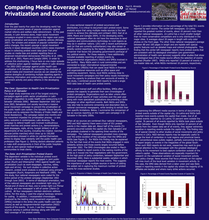
Abstract
Over the past twenty-five years the developing world has experienced several waves of popular contention against market reforms and welfare state retrenchment. In the past decade, in Latin America alone, major social movement campaigns erupted in every country in the region over public sector privatization and economic austerity policies (Almeida 2007). For scholars and analysts of popular contention and policy changes, this recent upsurge in social movement activity in lesser-developed countries (LDCs) raises important issues in collecting protest event data given that prior studies on media bias and protest reporting focus on advanced industrialized democracies (McCarthy et al. 1996; Smith et al. 2001; Myers and Caniglia 2004). In order to address this shortcoming, I focus here on one major episode of collective action against neoliberal reform in Latin America – the 2002-2003 campaign against public health care privatization in El Salvador. By comparing the coverage of several media and movement sources we can observe the relative strengths of combining multiple reporting agents in gathering information and constructing data sets on social movement activity and policy reforms in the developing world.
